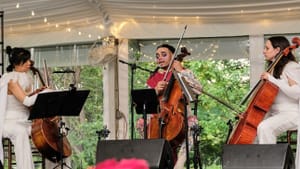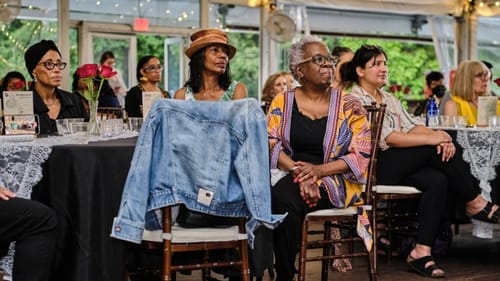Stay in the Loop
BSR publishes on a weekly schedule, with an email newsletter every Wednesday and Thursday morning. There’s no paywall, and subscribing is always free.
Heartache, love, and Lorca
Journey Arts presents Table Sessions: Daniel de Jesús at Bartram’s Garden

It was queer love in the time of dictatorship.
It was a multi-modal experience—musical, literary, culinary, communal—under a big tent, at sunset, in Bartram’s Garden, with a cello trio performing music composed by Daniel de Jesús and inspired by Federico García Lorca’s “Sonetos del Amor Oscuro” (“Sonnets of Dark Love”).
It was heartbreaking, relevant, and sublime.
In Table Sessions, a project of Journey Arts, de Jesús, a cellist, singer, songwriter, and recording artist, used their cello (named Jacqueline) to evoke the agitation, longing, and grief of Lorca’s sonnet sequence, written in 1935 against the backdrop of the imminent Spanish Civil War.
Lorca’s love
The sonnets, with titles like “Llagas de amor” (“Wounds of Love”), “Noche del amor insomne” (“Night of Sleepless Love”), and “El poeta dice la verdad” (“The Poet Tells the Truth”), chronicle Lorca’s secret affair with a much younger man—Juan Ramírez de Lucas was 19 and Lorca 37 when they met—at a time when such a relationship was not only fraught, but dangerous.
The poems were not published in Lorca’s lifetime; he was arrested and shot by Francoist forces in 1936 for his queerness and leftist politics. A secret version of the sonnets was published in the early 1980s; later, with the permission of his estate, they were printed in a Spanish newspaper.
De Jesús and the other cellists, Carolina Diazgranados and Mel Hsu, did more than resurrect a hidden slice of history. They used their instruments and de Jesús’s vocals—singing in Spanish while English translations appeared on a screen—to limn a story of passion that was always one breath away from pain.
Every aspect of the evening—the costumes, the fairy lights strung overhead, the curation of the sonnet sequence to move from excitement and yearning to betrayal and sorrowful resignation—created an experience that felt as much like ritual as performance.
Vulnerable together
We were in it together, seated at communal tables before the music began, sampling a meal designed by chef Cynthia Salamanca of Sandra’s Kitchen that included empanadas and gazpacho as an homage to Andalusian foodways and flavors.
Our table, typical of the audience as a whole, was a multi-ethnic group ranging from mid-20s to mid-70s: a young stage manager, a retired professor, a woman who heads her own flamenco company.

We talked of theater and dance, downsizing and Avian flu, stage management and the angst of finding a decent apartment in New York. And then the cellists entered: Diazgranados and Hsu in diaphanous white garments—part ghost, part angel—that included feather-collared capes.
De Jesús wore a similar outfit, though their cape had a hood (a nod, perhaps, to the stealth nature of Lorca’s love affair). Throughout the performance, de Jesús shed layers, ritually removing the flowy cape, then a red sequined tunic, to reveal a bodysuit hand-painted with lines from Lorca’s poems and swirls of tidal blue.
The effect was one of increased vulnerability—red appliqués on the bodysuit’s knees and neckline resembled dripping blood—as de Jesús, through their voice and cello, evoked the doomed trajectory of Lorca’s love and life.
Love and pain, past and present
In the first sonnets, the music, with de Jesús’s agitated bowing, matched the heart-thumping excitement of early love. But even these pieces held a premonition of grief: Hsu and Diazgranados coaxed mournful counterpoint from their cellos while de Jesús intoned the final lines of “El poeta habla por teléfono con el amor” (“The Poet Speaks by Telephone with Love”): “sweet, like a sob in falling snow/Distant and sweet…”
In these sonnets, love is never far from pain; communion and abandonment are twins. “Wounds of love” is rife with wrenching imagery: “This anguish of sky … this weeping of blood … a pulse-less lyre, a lustful torch.” At times, de Jesús’s voice keened with desolation. At other moments, they conjured desire, passion, fear, or rage.
Though the performance unfolded without an intermission, the program (illustrated with Lorca’s surprisingly whimsical line drawings; he was an artist, too) noted three distinct “chapters”: Longing for Connection, Emotional Abandonment, and Sleepless Thoughts in the Night. The middle section included a song by Tori Amos, contemporary balladeer of tortured love, which stitched together past and present.
Still fighting for the freedom to love
Marla Burkholder, artistic director of Journey Arts, spoke to the “why now?” question at the concert’s start. The event, in the midst of Pride Month, aimed to “pay respect and honor to those who continue to fight for the freedom to love,” she said.
De Jesús underscored that connection at the concert’s end. “We’re interested in leaving you with a little bit of heartache, but a lot of love,” they said, reminding listeners of the urgency of “protecting your neighbors, defending your neighbors, during this time.”
It felt especially poignant to hear Lorca’s words and de Jesús’s evocative interpretations two days before a planned military swagger in Washington, DC, a $45 million birthday parade for the authoritarian-in-chief.
On the cusp of that show of force—and the hundreds of “No Kings” demonstrations planned here and elsewhere in protest—strangers sat together as virtuosic performers lifted up a story of the heart’s irrepressible desire.
“Pues sin tu cariño/no vale la pena,” de Jesús sang. “Without your love/it just isn’t worth it.”
What, When, Where
Table Sessions: Daniel de Jesús. June 11-12, 2025, at Bartram’s Garden, 5400 Lindbergh Blvd, Philadelphia. (215) 729-5281 or journeyarts.org.
Accessibility
Bartram’s Garden includes paved gravel, dirt, and mown grass pathways. A wheelchair is available for visitor use, and golf cart rides may be arranged with advance notice. Bathrooms are wheelchair-accessible. Contact Bartram's Garden for questions.
Sign up for our newsletter
All of the week's new articles, all in one place. Sign up for the free weekly BSR newsletters, and don't miss a conversation.

 Anndee Hochman
Anndee Hochman